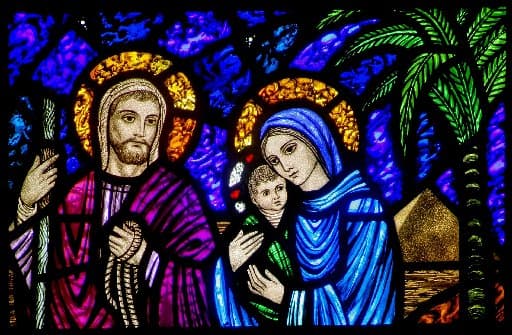In the usual cycle of the Church’s liturgical year, believers receive a double opportunity to celebrate the Nativity of the Lord on Christmas and his earthly family of Jesus, Mary, and Joseph on the Sunday afterwards.
Celebrated in close proximity this year, the two feasts give us different perspectives on the singular event of the coming of the long-awaited Anointed Savior.
While Christmas points us to the manger at Bethlehem, Holy Family Sunday shows us the mother and earthly father – the literal family – through which the Anointed Savior came to us. It is highly significant that the Savior came to us through a family. He did not fall from the sky or emerge from the seas. He did not simply appear one day, but rather was born into and to us through a family.
On this Sunday after Christmas, we can see the human side of a God who came to ransom us from sin and save us from the darkness of a fallen world.
Holy Family Sunday also points us to the very life of God. As the Savior was born into a human family, so he came from a divine family. As Pope Saint John Paul II taught, “God in his innermost essence is not solitude, but family.”
As the Father, Son, and Holy Spirit live in perfect unity, so in a similar way Jesus, Mary, and Joseph reflected that holiness in the life of the Holy Family.
In a uniquely human way, the Holy Family reflected on earth the all-powerful and ever-living union of the Father, the Son, and the Holy Spirit.
Like the divine family, the three members of the Holy Family– the God-Man, the perfected Virgin-Mother, and the Most Chaste Spouse – all lived together seeking to form a communion of love and selfless service.
In this way, the Holy Family serves as an icon of the Triune God. It is a window into the inner life of the Holy Trinity and stands as a model for every family on earth. The Catechism of the Catholic Church emphasizes this point when it teaches: “The Christian family is a communion of persons, a sign and image of the communion of the Father and the Son in the Holy Spirit.”
The reality of the Savior coming to us in a family shows us the goodness and sacredness of family life. It reveals to us our own vocation to those within our family. As Saint Paul writes: “For this reason I bow my knees before the Father, from whom every family in heaven and on earth takes its name.”
Every Christian family, therefore, is summoned to live the Trinitarian life on earth. Drawing from the lives of Jesus, Mary, and Joseph, the Christian family is marked by the love that is shared between its members: parents to children, children to parents, siblings among themselves, and the nuclear family to the extended family.
The Christian family is summoned to be a beacon of faith, a model of charity, and an enduring witness to hope. As a family dedicated to the Lord Jesus, it is to be a place of prayer, love, justice, and mercy.
As the Holy Family of Jesus, Mary, and Joseph points humanity to the divine family of the Father, Son, and Holy Spirit, so it serves as a model for all families today. It is the divine assistance that can allow families to heal brokenness, to give forgiveness, to reconcile over injuries, to find consolation in grief, and to be a source of encouragement and acceptance.
Rather than closing in on itself and falling prey to any misplaced tribalism, the Christian family is sent out and commissioned to share its way of life with all men and women, especially the most vulnerable and forgotten. The Christian family is to be a haven for the poor and the marginalized. It is to seek to be a place of rest for the lost, weary and the downtrodden.
This is the call of the Christian family. It is not an easy mission or a task to be taken lightly. It is a weight of glory, a vocation given by God to each family, which he has named and continues to bless with his strength and power.
Follow Father Jeffrey Kirby on Twitter: @fatherkirby.















